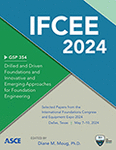Frequency of Observed Anomalies in Drilled Piles Integrity Tested by Thermal Methods
Publication: IFCEE 2024
ABSTRACT
The structural integrity of concrete cast in place drilled foundations is often determined by cross hole sonic logging, low strain impact-echo, gamma-gamma logging, or thermal integrity methods. Studies have characterized the frequency of observed significant anomalies detected by the first three methods. This study reviews a large database of drilled foundations tested by thermal methods over the last seven years. The frequency and general location in the shaft of major anomalies, as characterized by a 6% effective radius reduction criteria, are summarized and reviewed. Based on these criteria, anomalies occur in approximately 15% of the 2104 shafts reported. Of those 318 drilled foundations with anomalies, 77 (28%) identified anomalies occur within a length equivalent to the bottom two diameters of the foundation element, a rate similar to that reported by studies using other integrity methods.
Get full access to this chapter
View all available purchase options and get full access to this chapter.
REFERENCES
Amir, E. I., and Amir, J. M. (2008). “Statistical Analysis of a Large Number of PEM Tests on Piles”, Proc. 8th Intl. Conf Application of Stress Wave Theory to Piling, IOS Press. 749 pages.
ASTM. ASTM Standard D5882, 2016, Standard Test Method for Low Strain Impact Integrity Testing of Deep Foundations, ASTM International, West Conshohocken, PA, 2003. https://doi.org/10.1520/D5882-16, www.astm.org.
ASTM. ASTM Standard D6760, 2016, Standard Test Method for Integrity Testing of Concrete Deep Foundations by Ultrasonic Crosshole Testing, ASTM International, West Conshohocken, PA, 2003. 10.1520/ D6760-16, www.astm.org.
ASTM. ASTM Standard D7949, 2014, Standard Test Methods for Thermal Integrity Profiling of Concrete Deep Foundations, ASTM International, West Conshohocken, PA, 2003. https://doi.org/10.1520/D7949-14, www.astm.org.
Belardo, D., Robertson, S., and Coleman, T. (2021). “Interpretation and Evaluation of Thermal Integrity Profiling Measurements” DFI 50th Annual Conference on Deep Foundations.
Boeckmann, A., Yeskoo, R. A., and Axtell, P. (2022). “Use of Thermal Integrity Profiling (TIP) in Drilled Shaft Evaluation.” Missouri Department of Transportation. 121 pages.
Boeckmann, A., and Loehr, J. E. (2019). Evaluation of Thermal Integrity Profiling and Crosshole Sonic Logging for Drilled Shafts with Concrete Defects.” Transportation Research Record, 2673(8):036119811984211.
Brown, D., Turner, J., Castelli, R., and Loehr, J. E. (2018). “Drilled Shafts: Construction Procedures and Design Methods, GEC 10”. Federal Highway Administration,. 756 pages.
Faiella, D., and Superbo, S. (1998). “Integrity Non-Destructive Tests of Deep Foundations by Means of Sonic Methods - Analysis of the Results Collected on 137 Sites in Italy,” Proceedings, 3rd International Geotechnical Seminar on Deep Foundations on Bored and Auger Piles, Ghent, Belgium, 19-21 Oct., Balkerria,Rotterdam, pp. 209–213.
Hannigan, P., and Moghaddam, R. (2019). “Use and Comparison of New QA/QC Technologies in a Test Shaft” Proceedings of the GeoMEast Conference.
Hertlein, B., and Davis, A. (2006). Nondestructive Testing of Deep Foundations. Nondestructive Testing of Deep Foundations. 1–270. https://doi.org/10.1002/0470034831.
Hyatt, T., Belardo, D., and Webster, J. (2019). “Cost and Technical Ccomparison of Non-Destructive Test Methods for Drileed Shafts.” Proceedings of the Annual Conference of the Deep Foundations Institute.
Jalinoos, F., Mekic, N., and Kanaan, H. (2005). “Defects in Drilled Shaft Foundations: Identificaiton, Imaging and Characterization.”. 138 pages.
Jones, W. C., and Wu, Y. (2005). “Experiences with Cross-hole Sonic Logging and Concrete Coring for Verification of Drilled Shaft Integrity”, ADSC GEO3 Construction Quality Assurance/Quality Control Technical Conference, Dallas Nov 2005.
Mullins, G. (2010). “Thermal Integrity Profiling of Drilled Shafts.” Deep Foundations Institute Journal - The Journal of the Deep Foundations Institute, 4:2, 54–64.
Murrell, K. (2013). “Crosshole Sonic Logging: A 10 Year Perspective.” Geo3T2 Conference Presentation, NCDOT.
O’Neill, M. W., and Sarhan, H. A. (2004). “Structural Resistance Factors for Drilled Shafts Considering Construction Flaws” Current Practices and Future Trends in Deep Foundations. ASCE. Pages: 166–185.
Piscsalko, G., Likins, G., and Mullins, G. (2016). “drilled shaft acceptance criteria based upon thermal integrity.” DFI 41st Annual Conference on Deep Foundations, New York, NY.
Sellountou, E. A., Amir, J., Canivan, G., Chernauskas, L., Hertlein, B., Kandaris, P., Kovacs, T., and Likins, G. (2019). “Terminology and Evaluation Criteria of Crosshole Sonic Logging (CSL) as applied to Deep Foundations.” Deep Foundations Institute,.
Stark, T. (2022). “Evaluating the Accuracy and Use of Drilled Shaft Integrity Test Methods in Illinois.” Illinois Department of Transportation,. 72 pages.
Webster, K., Rausche, F., and Webster, S. (2011). “Pile and shaft integrity test results, classification, acceptance and/or rejection.” TRB 90th Annual Meeting Compendium of Papers, Transportation Research Board.
Information & Authors
Information
Published In
History
Published online: May 3, 2024
ASCE Technical Topics:
Authors
Metrics & Citations
Metrics
Citations
Download citation
If you have the appropriate software installed, you can download article citation data to the citation manager of your choice. Simply select your manager software from the list below and click Download.
